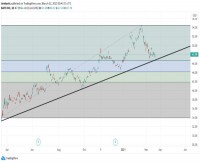|
By Mark Melin Investors who bought into the uncorrelated, liquid alternatives managed futures message have been disappointed recently, noted Matt Osborne of Altegris Advisors, co-author of the recently released white paper "Is the Trend Your Friend?" Written with Lara Magnusen, a director at Altegris, the white paper studies the long term performance characteristics of managed futures and perhaps most significant explains the beta market environment that contributed to managed futures relative under performance. 
Matt Osborne is director of Altegris Funds. Altegris was among the early managed futures brokerage firms to offer the investment in a mutual fund product structure. Previous to Altegris he was Director of Research for Managed Investments at Man Financial.
Mark Melin (MM): How important is an understanding the market environment in terms of setting appropriate performance managed futures expectations? Matt Osborne (MO): It's critical. Understanding not only the current environment as well as having a historical framework is key to developing a long -term perspective. All asset classes go through cycles, ensuring investors understand these cycles helps investors to better understand the diversification benefits of managed futures as well as manage their performance expectations. MM: On a historical basis trends have always been a component of market environments. How important is the mean reversion aspect of trends appearing and not appearing in markets. Winton's David Harding is quoted as saying: "Trends come and go and we can't predict when they will come next, but we know they will come." Could managed futures be set for a period of mean reversion? IE: is the strategy "due" for a resumption of trends? MO: Mr. Harding is correct; we can't predict. Based on experience, however, I think trend following managers are potentially poised to capitalize on future breakout movements in the markets. We witnessed significant market reversion post May 22nd - when Bernanke hinted that QE tapering was on the horizon. It appears as if we may be moving from a mean-reverting phase of prior years to a trending phase-providing a ripe environment of opportunity for trend followers over the remainder of 2013. MM: In the white paper, you mention markets "Whipsawing between risk-on and risk-off environments constrains trend persistence." What will it take for this type of non-productive trend following environment to change? "When will things improve? A bedrock principle of managed futures is that they simply require persistence of trends-in either direction-in order to potentially deliver strong returns." MO: We've essentially had a perfect storm for trend following managers. Thankfully, the damage has been minimal in our view vs. drawdowns in long only asset classes. When will things improve? A bedrock principle of managed futures is that they simply require persistence of trends-in either direction-in order to potentially deliver strong returns. We've seen some signs of increased price persistence already. The true catalyst could be a number of things, from increased volatility, a persistent rise in interest rates, to less government intervention in financial markets. MM: With the potential for the Fed to pull back from manipulating the yield curve, does this have potential for market trends to re-emerge? What has been the impact of QE on the managed futures industry at large? "With tapering potentially on the horizon, you can see by just looking at a chart of the 10-year, that trend looks to have reversed. QE has also hurt trend followers because it has created a domino effect of global deleveraging." MO: QE has both helped and hurt. The Fed bond buying program has helped interest rate trends, pushing yields to historical lows - creating the ultimate "don't fight the Fed" trend. With tapering potentially on the horizon, you can see by just looking at a chart of the 10-year, that trend looks to have reversed. QE has also hurt trend followers because it has created a domino effect of global deleveraging. As various countries essentially manipulate their currencies, FX markets have become increasingly choppy and difficult for trend following managers. In general, I think as the Fed and governments become less involved in introducing new or continuing existing policies, it will create the potential for trends across markets to re-emerge - since markets will rely more heavily on historical market drivers and not having to try and navigate and interpret what certain policies mean and don't mean and the impact those policies may or may not have. MM: Altegris is known as traditionally allocating assets heavily in the trend following category. There is no doubt it is the most predominate strategy with a valid beta market environment. What degree of value, if any, do you find in relative value or volatility strategies not dependent on the market environment of price persistence? MO: There is a great deal of value; these strategies take a different approach to finding alpha, the merits of which is a much deeper discussion. MM: What is the difference between a trend and momentum strategy? MO: Not everyone may answer this same way, but in our view, momentum strategies are a type of trend strategy that is seeking directionality. They are agnostic as to whether markets have momentum on the downside or upside. MM: What's the key point, the drop dead line, you want people to take away from this report? MO: We want to acknowledge that it has been challenging for managed futures managers and those invested in managed futures. At the same time, we hope that readers understand that no one can time a market's top and bottom perfectly-and those who maintain a long-term allocation to managed futures, in our view, have the opportunity to experience the most complete range of potential benefits offered by the strategy. |
|
This article was published in Opalesque Futures Intelligence.
|





 RSS
RSS









